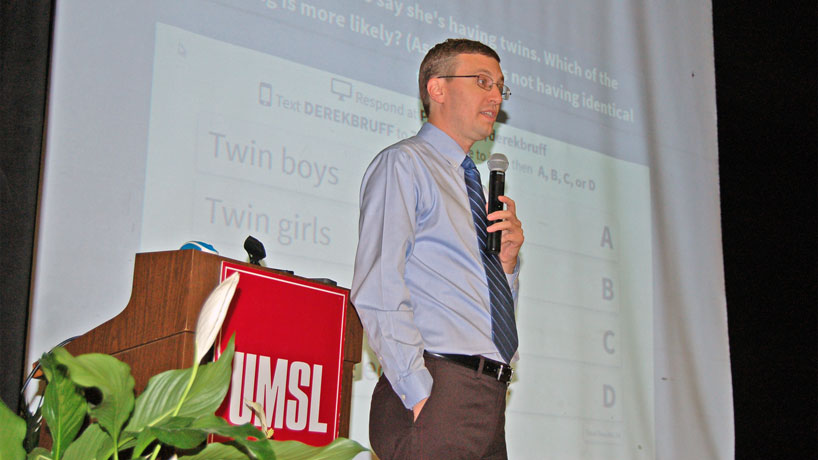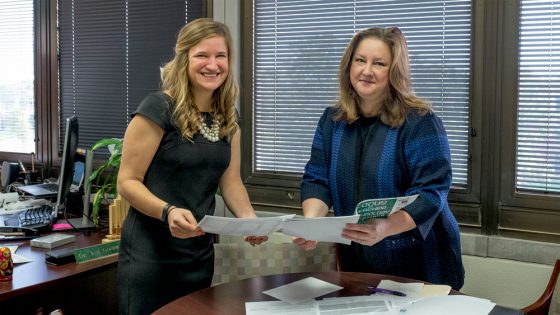
Derek Bruff, featured speaker of the 2016 Focus on Teaching and Technology Conference, explains how he uses a polling application to engage students in learning mathematics. The Vanderbilt University professor said the app helped create a collaborative learning environment, ideal for the “flipped” or “studio” classroom teaching models. (Photo by Bob Samples)
Can teaching mathematics really be fun? And, if fun, can it be effective?
Derek Bruff seems to think so.
The Vanderbilt University professor was the keynote speaker at the Focus on Teaching and Technology Conference at the University of Missouri–St. Louis, which attracted more than 500 instructors from UMSL and other universities throughout the Midwest Nov. 3 and 4. Bruff’s presentation was titled “Class Time Reconsidered.”
Pulling out his smartphone, Bruff demonstrated a digital application – PollEv.com – that he uses in a probability and statistics class and invited the crowd to participate. The app allowed the crowd to share real-time responses to questions – including poll results – which were projected on a large screen.
Bruff said the technology helps facilitate a “peer instruction model” that he has found effective in his math courses. The instructor poses questions in class, students answer independently and the instructor shares the results. This leads to a possible “revote” as students discuss their rationales among themselves.
For 90 minutes, Bruff outlined various methods of instruction – including the “traditional” approach, “flipped classroom” approach and “studio” approach. Peer instruction lends itself better to the latter two approaches.
The traditional model centers on the professor lecturing, transferring knowledge to students who perform assignments after class.
Students typically watch online lectures, collaborate in online discussions, carry out research at home prior to class and engage in concepts with the guidance of an instructor in a flipped classroom.
The studio approach is similar to the flipped classroom with more group and collaborative activities. Oftentimes, the classroom setting is arranged with round tables to encourage interaction.
Bruff said class time is a precious commodity – typically about 150 minutes a week – and instructors need to make the most of that time to affect learning.
“Consider a topic or module you teach,” he said. “Which of these approaches would make the most of class time?”

The UMSL Center for Teaching and Learning’s Emily Goldstein (at left) and Keeta Holmes organized the conference, which the university has hosted for 15 years. (Photo by August Jennewein)
Bruff’s presentation was well received, as were numerous other sessions involving 105 presenters – 16 from UMSL, according to Keeta Holmes, assistant director of UMSL’s Center for Teaching and Learning. Holmes and her colleague Emily Goldstein organized the event. UMSL has hosted the conference for 15 years.
“FTTC started as an UMSL-only professional development conference and expanded to include regional partners in the mid-2000s,” Holmes said. “This year, our planning committee has representatives from 12 institutions and sessions from 17 institutions and 6 vendors.”
The conference remains relevant and growing because area college instructors are always looking for ways to hone their teaching skills – including effective uses of technology – to better achieve positive learning outcomes, Holmes said.
“The conference program has evolved over the years to reflect emerging trends in technology applications in higher education and online teaching strategies,” Holmes said. “While session presentations introduce technology tools, the FTTC planning committee selectively designs the program to create a conversation about the proper application of technology. We grow every year due in large part to how our program resonates with the teaching community in the Midwest.”
Holmes also said that not all sessions focus on technology or online instruction but most do, as technology is pervasive in the world of teaching today.















